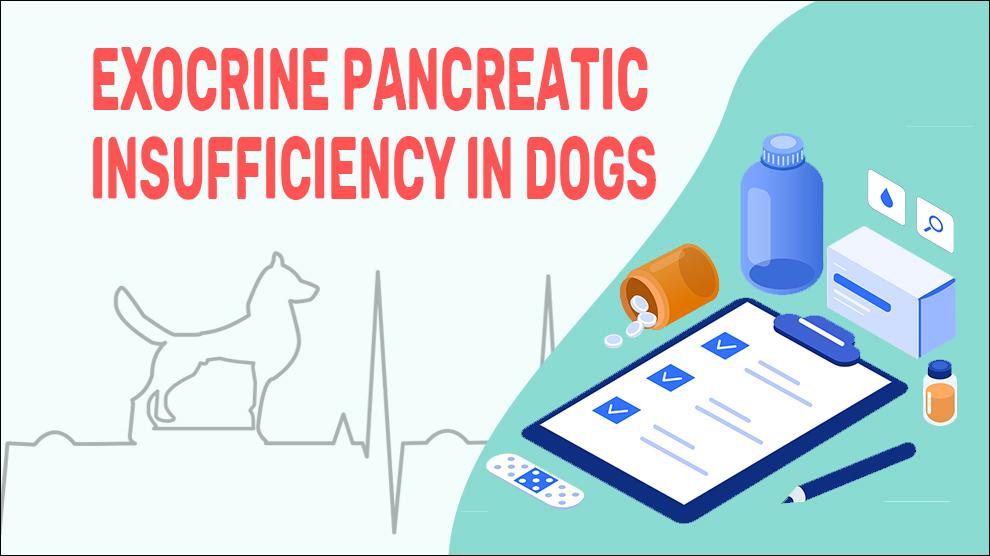Exocrine Pancreatic Insufficiency (or simply EPI) is a disorder characterized by inadequate synthesis and secretion of the exocrine enzymes of the pancreas, resulting in maldigestion or the failure to digest food appropriately. This usually occurs only after 90% of the exocrine pancreas gets dysfunctional. The etiopathogenesis of EPI involves pancreatic and/or non-pancreatic causes.
Pancreatic acinar atrophy (PAA) is the condition frequently attributed to EPI, in which enzyme-producing acinar cells are believed to be selectively destroyed by an inherited autoimmune process leading to maldigestion signs. While many breeds of dog have been found to be affected, EPI caused by PAA is highly prevalent amongst the German Shepherds and rough-coated collies; GSDs covers two-thirds of cases of EPI.
EPI is characterized by progressive loss of the exocrine pancreatic functional reserve capacity. Therefore, a reduction of pancreatic enzymes intraduodenal concentration, Small intestinal bacterial overgrowth (SIBO), bicarbonate, poor cobalamin levels, as well as GI and pancreatic regulatory peptides are observed. Ultimately as a result of EPI, mal-assimilation of nutrients (proteins, fats, vitamins, carbohydrates, and trace elements), functional and morphologic changes in the small intestine are produced.
The symptoms of EPI are not pathognomonic in dogs. The differential diagnosis includes inflammatory bowel disease, short bowel syndrome, intestinal parasites, small intestinal villus atrophy, diffuse small intestinal malignancies, changes in the intestinal brush border enzyme activities, and lymphangiectasia.
Symptoms Of Exocrine Pancreatic Insufficiency
- Abdominal pain
- Diarrhea/frequent bowel movements
- Loud rumbling sounds from the stomach
- Frequent gas
- Severe lethargy
- Recurrent vomiting
- Severe dehydration
Treatment Options For Exocrine Pancreatic Insufficiency
- Enzyme replacement and nutritional intervention(Powdered pancreatic enzymes, Cobalamin injections, vitamin supplements
- Pain medications
- Intravenous fluids
- Antibiotics, in the case of SIBO, are suspected (tetracyclines, Metronidazole, and tylosin)
- Anti vomiting medication (antiemetics)
- Pancreatectomy: surgery to remove all or part of the pancreas
Other drugs and the need for surgery will be entirely at your vets’ disposal after determining the severity of cysts.
Home Remedies For Exocrine Pancreatic Insufficiency
Follow the instructions given to you by your veterinarian for the entire recommended time period. No matter how badly you want relief for your dogs or what you hear from other dog owners, talk with your vet before trying any home remedy.
Make sure to provide plenty of drinking water.
If any specific diet has been suggested to your dog, follow the diet very strictly, and never provide or allow others to give your dog treats or other food.
Prevention Of Exocrine Pancreatic Insufficiency
Prevention is not possible for EPI as the causes in dogs is varied. Treatment and survival rates vary depending on the grade and stage of the condition.
Good overall health and early detection are the only ways to prevent EPI.
Check your dog on a regular basis and consult your veterinarian immediately if you find any odd lumps or lesions.
Affected Breeds Of Exocrine Pancreatic Insufficiency
Chow Chow, Cavalier King Charles Spaniel, Rough Collie, German Shepherd, Young Dogs, Middle Age Dogs, Senior Dogs, Boxer, Dachshund, English Setter, Cocker Spaniel, Yorkshire Terrier, Sled Dogs
Additional Facts For Exocrine Pancreatic Insufficiency
1. Causes:
- Pancreatic acinar atrophy
- Pancreas infection
- Pancreatic cancer
- Pancreas injury
- Autoimmune diseases
- Hypercalcemia - elevated blood calcium levels
- Increased levels of blood fats (cholesterol)
- Damage to pancreatic functions due to improper usage of medicines
- Hereditary conditions that harm the pancreas, such as cystic fibrosis
2. Types:
Congenital EPI: Some breeds such as GSD inherit the condition
Acquired EPI: This is generally caused due to Pancreas infection, Pancreatic cancer, Pancreas injury, Autoimmune diseases, Hypercalcemia (elevated blood calcium levels), etc
3. Mortality:
Although the mortality rate of EPI is not available, it causes severe damage to your pancreas. So typically the survival rate will be reduced if not treated properly.
4. Diagnosis:
- Routine hematology, urinalysis
- Glucose level exams
- Test for hypoglycemia
- Tissue biopsy
- Abdominal radiographs, ultrasound, or CT scan
5. Differential diagnosis:
Pancreatic diseases:
- Acute & chronic pancreatitis
- Adenocarcinoma of the pancreas
- Pancreatic artery pseudoaneurysm
- Pancreatic cystic neoplasms
Extrapancreatic diseases:
- Peptic ulcer disease & gastric cancer
- Acute cholecystitis & gallstones
- Abdominal aortic aneurysm
- Intestinal ischemia
- Ovarian cysts & cancers
- Bowel obstruction
6. Prognosis:
The prognosis for EPI is really good. The only problem is the existing condition is really hard to identify in the initial stages as the symptoms mimic various other conditions. Relapse is also possible following medical treatment in affected dogs.
When To See A Vet
Time to visit the vet clinic for an examination, if you notice any of the following:
- Abdominal pain
- Severe dehydration
- Recurrent vomiting
Food Suggestions For Exocrine Pancreatic Insufficiency
- Diet high in protein, fat, and complex carbs
- Protein: High protein diet comprising 40% of dogs calories
- Fats: Omega-3 and other healthy fats
- Complex Carbohydrates: fibers and starches (Whole Grains, Oatmeal, Brown Rice, Potatoes & Sweet Potatoes)
- Overweight dogs - lower-calorie diets, for underweight dogs- Higher calorie diets
- Feed foods having a lower ( or moderate) Glycemic Index and Glycemic Load than others
Conclusion
Dogs that have been diagnosed with EPI should be closely monitored for the pancreas functionality to ensure prompt treatment for any changes.
The prognosis for EPI is unpredictable and is dependent mostly on the actual cause.
Most dogs with this condition never show any external symptoms but may continue to have unimpeded pancreas function.

















